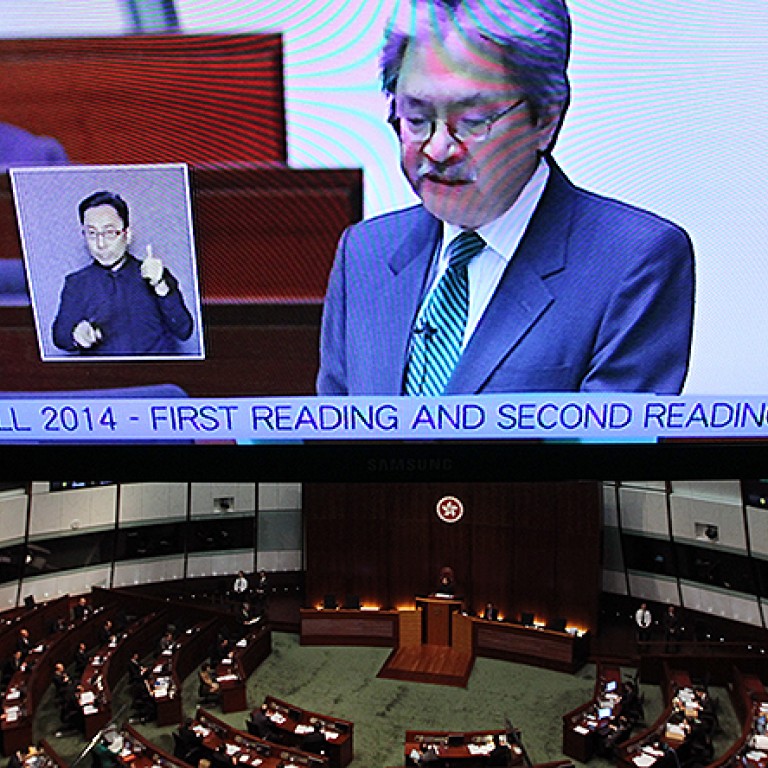
Update | It’s time to swallow some bitter pills, John Tsang warns in budget speech
One-off sweeteners cut 40pc as finance chief prepares for greying society and HK$12b surplus
Financial chief John Tsang Chun-wah tightened the purse strings yesterday and pledged to consider higher water tariffs and a "future fund" as he set out a worst-case scenario for public finances: a structural deficit in seven years.
Tsang estimated a budget surplus of just HK$12 billion to justify trimming one-off relief measures 40 per cent, from HK$33 billion to HK$20 billion, saying he was preparing for an ageing population.
I believe the present generation recognises the importance of fiscal prudence: that is, to avoid making today's spending a burden for the next generation
Independent analysts have estimated a surplus of up to HK$40 billion for 2013-2014.
"I believe the present generation recognises the importance of fiscal prudence: that is, to avoid making today's spending a burden for the next generation," he said. But, he added: "We should neither take the problem lightly nor over-worry. Our public finances are still in good shape."
Citing dire warnings from economists advising him on long-term policy, Tsang said: "[If] we take effective actions, we can prevent the projected results from surfacing and avoid subjecting future generations to irreversible fiscal plight."
Tsang scrapped a HK$1,800 electricity subsidy in place since 2008, cut the rent-free period for public-housing tenants from two months to one and offered a property rate waiver for two quarters, rather than the full year.
He said the abolition of the sweeteners would contribute to a 6 per cent cut in spending and a predicted surplus of HK$9.1 billion in 2014-15.
But the package drew the ire of middle-class people already upset the chief executive's policy address last month focused on the poor. To address criticism, Tsang retained a salaries tax waiver of up to HK$10,000, and increased allowances for dependent parents and grandparents.
Tsang's budget reflected projections from his expert working group that next week will release a report warning the city's vast reserves - due to hit HK$745.9 billion next month - risk being wiped out by deficits.
Tsang said the panel had set out three scenarios showing that a structural deficit would emerge in seven to 15 years, depending on how quickly spending on health, welfare and education rose.
Despite the dire warnings, Tsang offered no big ideas on revenue. While agreeing with the working group that the city needed a broader revenue base, he said introducing new taxes would be difficult.
Instead, the government will increase 200, unspecified, fees and charges to raise HK$60 million a year. It will consider other fee increases, including the first rise in the water tariff for 19 years.
"I won't allow a structural deficit to emerge in eight to 10 years," Tsang said later.
He was considering the working group's idea of a "future fund" consisting of the Land Fund - which has HK$219.7 billion in land revenue from pre-handover years, and a portion of future surpluses - to pay for infrastructure when there was a budget deficit.
But Chinese University economist Professor Chong Tai-leung warned the fund could cause conflict because people would want more handouts or less tax.
Baptist University economist Dr Mo Pak-hung said: "If the government attempts to boost its popularity by increasing welfare … no fund will offer real help."
Main points
- Salaries tax rebate of up to HK$10,000 stays; property rates waiver reduced; electricity subsidy goes
- Government to record HK$12 billion surplus for year to next month; HK$9 billion surplus predicted for next year
- GDP growth projection for next five years reduced from 4 per cent to 3.5 per cent
- Budget to be in structural deficit within seven to 15 years

